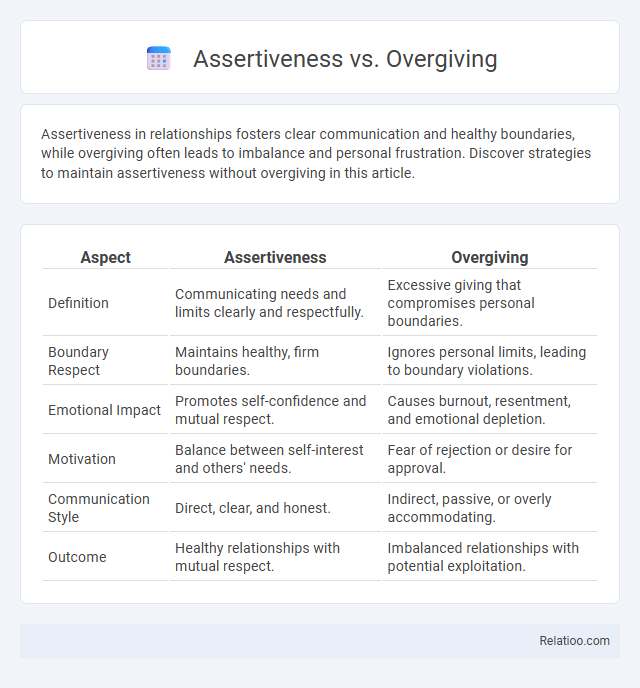Assertiveness in relationships fosters clear communication and healthy boundaries, while overgiving often leads to imbalance and personal frustration. Discover strategies to maintain assertiveness without overgiving in this article.
Table of Comparison
| Aspect | Assertiveness | Overgiving |
|---|---|---|
| Definition | Communicating needs and limits clearly and respectfully. | Excessive giving that compromises personal boundaries. |
| Boundary Respect | Maintains healthy, firm boundaries. | Ignores personal limits, leading to boundary violations. |
| Emotional Impact | Promotes self-confidence and mutual respect. | Causes burnout, resentment, and emotional depletion. |
| Motivation | Balance between self-interest and others' needs. | Fear of rejection or desire for approval. |
| Communication Style | Direct, clear, and honest. | Indirect, passive, or overly accommodating. |
| Outcome | Healthy relationships with mutual respect. | Imbalanced relationships with potential exploitation. |
Understanding Assertiveness and Overgiving
Assertiveness involves confidently expressing personal needs and boundaries while respecting others, promoting healthy communication and self-respect. Overgiving occurs when individuals excessively prioritize others' needs at the expense of their own well-being, leading to potential burnout and resentment. Understanding the balance between assertiveness and overgiving helps maintain emotional health and fosters mutually respectful relationships.
Core Differences Between Assertiveness and Overgiving
The core difference between assertiveness and overgiving lies in the balance of self-respect and boundary-setting; assertiveness empowers you to express your needs confidently while maintaining healthy limits, whereas overgiving often leads to neglecting your own well-being in favor of pleasing others. Assertiveness promotes mutual respect and clear communication, ensuring your rights are acknowledged without infringing on others. Overgiving can result in emotional exhaustion and resentment, as it blurs the line between generosity and self-sacrifice.
Psychological Roots of Assertiveness and Overgiving
Assertiveness originates from a balanced sense of self-confidence and clear personal boundaries, rooted in healthy psychological development and positive self-esteem. Overgiving often stems from underlying fears of rejection or a deep need for approval, reflecting insecure attachment patterns or unresolved childhood experiences. Understanding these psychological roots helps differentiate assertiveness as a form of self-respect from overgiving, which may perpetuate emotional exhaustion and neglect of one's own needs.
Signs You Are Being Assertive vs. Overgiving
Signs you are being assertive include expressing your needs clearly, maintaining respectful boundaries, and confidently stating your opinions without guilt. In contrast, overgiving often involves sacrificing personal needs, agreeing to requests out of obligation, and experiencing resentment or burnout. Recognizing these behaviors helps maintain healthy relationships by balancing self-respect with empathy.
Impact of Assertiveness on Relationships
Assertiveness fosters clear communication and mutual respect, strengthening trust and emotional intimacy in relationships. Overgiving often leads to imbalance and resentment, while assertiveness helps you set healthy boundaries without sacrificing connection. Your ability to express needs and listen actively directly influences the quality and longevity of your relationships.
Consequences of Overgiving on Mental Health
Overgiving often leads to burnout, elevated stress levels, and diminished self-esteem, profoundly impacting mental health. Individuals who consistently prioritize others' needs over their own risk developing anxiety, depression, and emotional exhaustion. Establishing healthy boundaries and practicing assertiveness can mitigate these negative consequences and promote psychological well-being.
Balancing Assertiveness and Compassion
Balancing assertiveness and compassion is essential to maintain healthy relationships while honoring your own needs. Assertiveness empowers you to communicate boundaries clearly and confidently without disregarding others' feelings, whereas overgiving often leads to burnout and resentment due to neglecting personal limits. Finding equilibrium between standing up for yourself and showing empathy fosters mutual respect and emotional well-being.
Overcoming the Tendency to Overgive
Overcoming the tendency to overgive requires setting clear boundaries and recognizing your own needs as equally important to others'. You can practice assertiveness by communicating your limits respectfully and prioritizing self-care without guilt. This balance helps prevent burnout and fosters healthier, more reciprocal relationships.
Building Healthy Assertiveness Skills
Building healthy assertiveness skills involves recognizing the balance between expressing your needs confidently and respecting others without resorting to overgiving or passive behavior. You can establish clear boundaries to prevent burnout and maintain self-respect while fostering open communication that encourages mutual understanding. Developing assertiveness equips you with tools to advocate for yourself effectively without compromising relationships or personal well-being.
Practical Tips for Transitioning from Overgiving to Assertiveness
Establish clear personal boundaries by identifying your priorities and practicing saying no to excessive demands without guilt. Use assertive communication techniques such as "I" statements to express your needs confidently while maintaining respect for others. Regularly self-reflect and adjust your balance between giving and self-care to avoid burnout and ensure sustainable relationships.

Infographic: Assertiveness vs Overgiving
 relatioo.com
relatioo.com